Unit 3 It must belong to Carla Section A 1a-2d课件(共38张PPT)
文档属性
| 名称 | Unit 3 It must belong to Carla Section A 1a-2d课件(共38张PPT) |
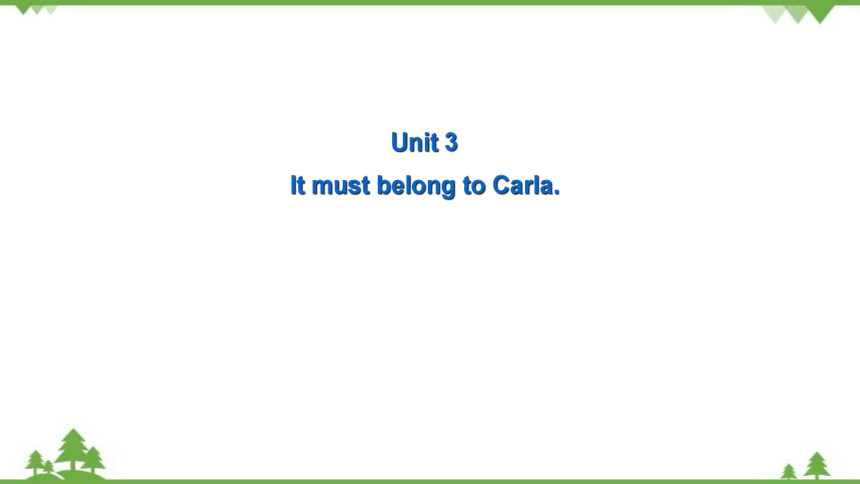
|
|
| 格式 | ppt | ||
| 文件大小 | 3.8MB | ||
| 资源类型 | 教案 | ||
| 版本资源 | 鲁教版 | ||
| 科目 | 英语 | ||
| 更新时间 | 2022-11-13 00:00:00 | ||
图片预览

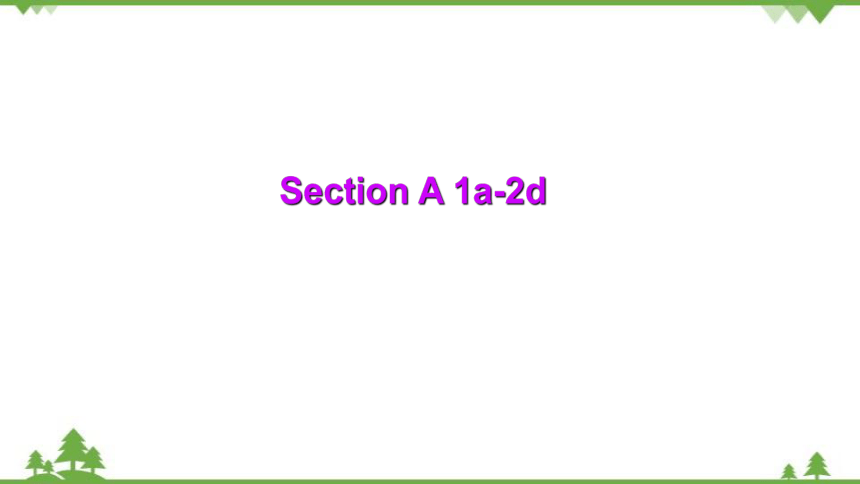
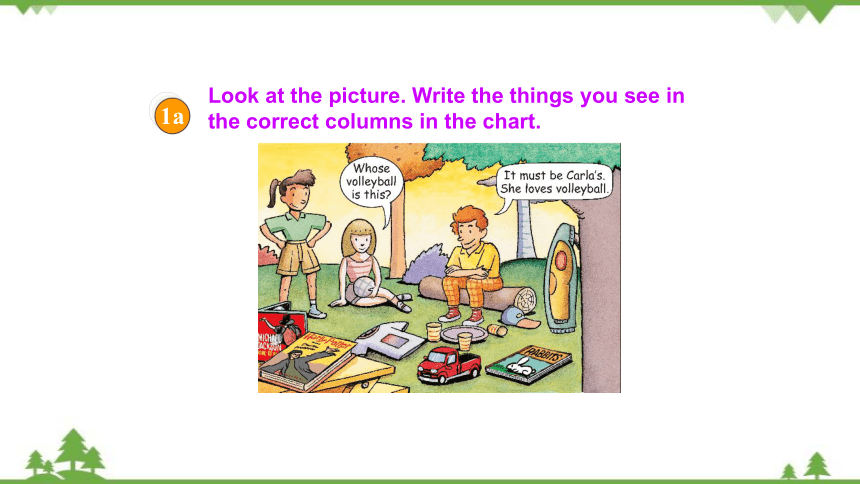
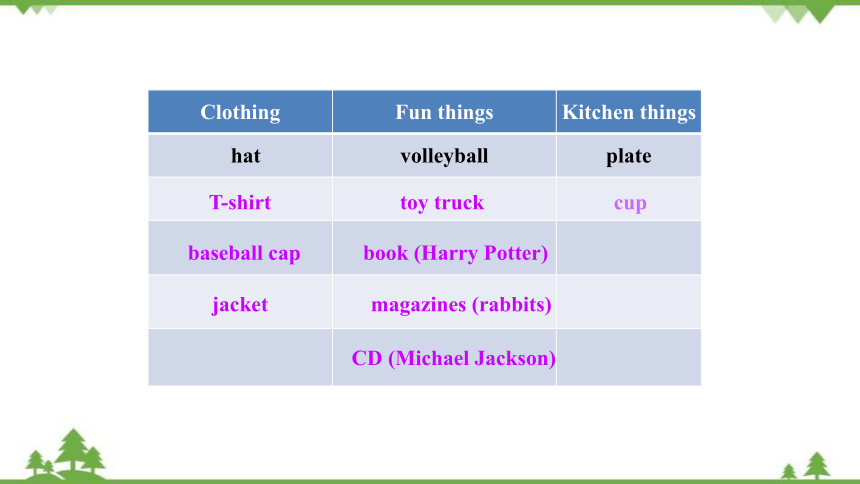



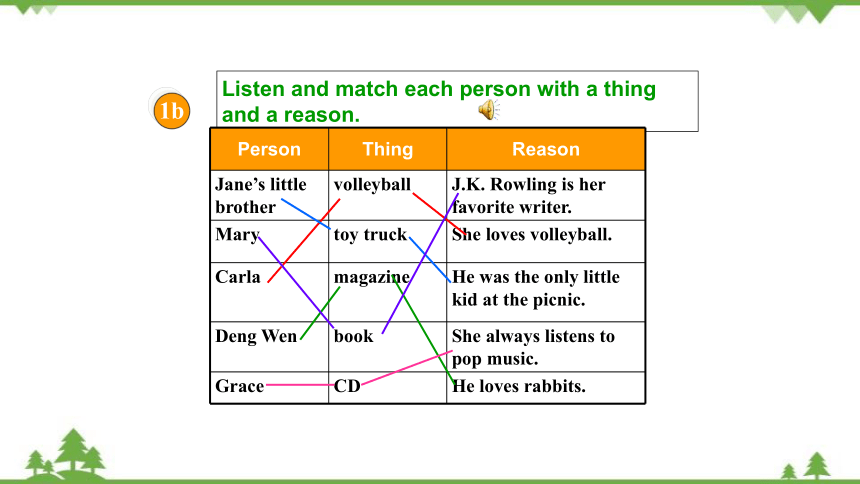
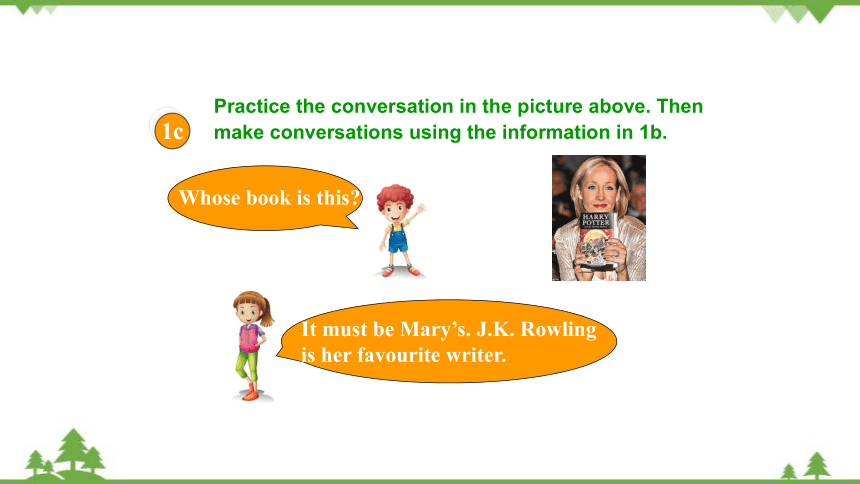
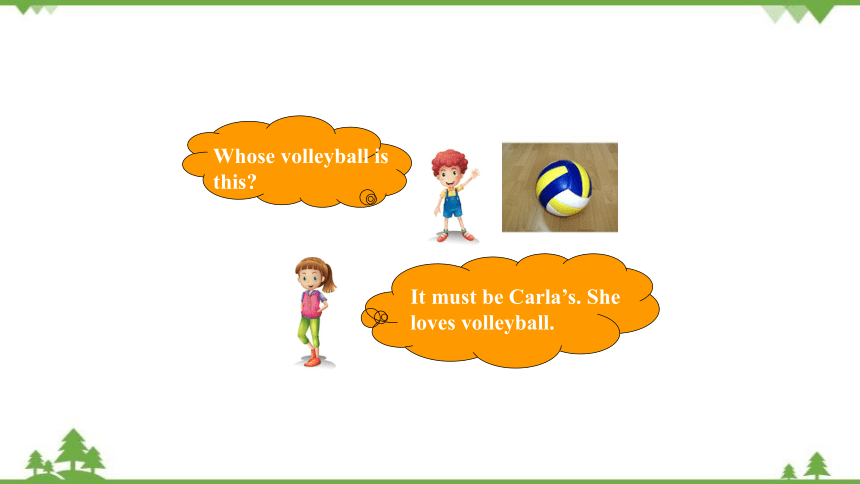
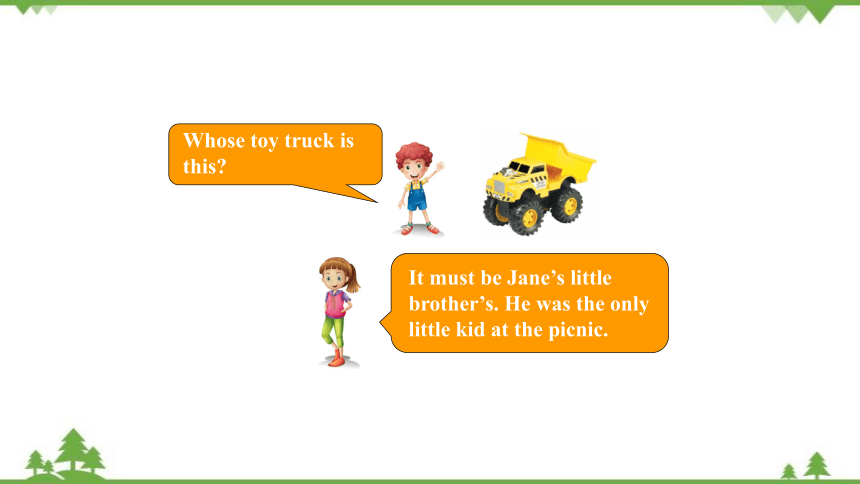
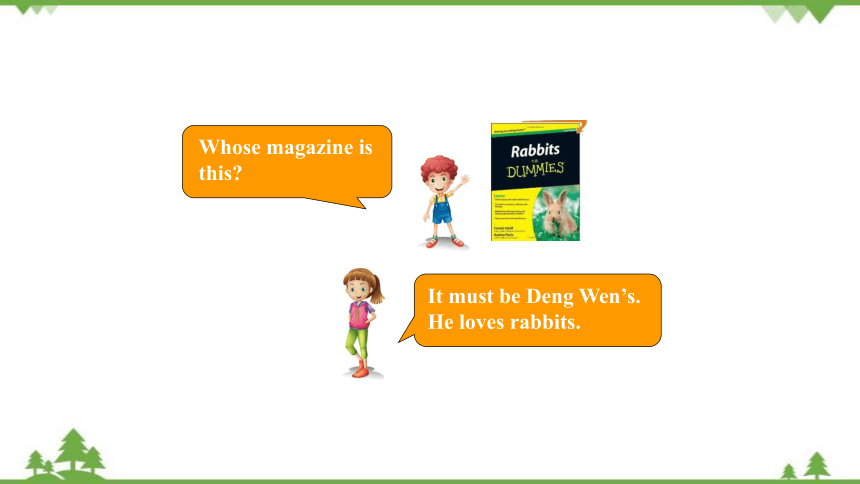
文档简介
(共38张PPT)
Unit 3
It must belong to Carla.
Section A 1a-2d
Look at the picture. Write the things you see in the correct columns in the chart.
1a
Clothing Fun things Kitchen things
hat volleyball plate
T-shirt
jacket
baseball cap
toy truck
book (Harry Potter)
magazines (rabbits)
CD (Michael Jackson)
cup
Presentation
truck n. 卡车; 货车
picnic n. 野餐
rabbit n. 兔; 野兔
Listen and match each person with a thing and a reason.
Person Thing Reason
Jane’s little brother volleyball J.K. Rowling is her favorite writer.
Mary
toy truck
She loves volleyball.
Carla
magazine
He was the only little kid at the picnic.
Deng Wen book She always listens to pop music.
Grace CD He loves rabbits.
1b
Practice the conversation in the picture above. Then make conversations using the information in 1b.
It must be Mary’s. J.K. Rowling
is her favourite writer.
Whose book is this
1c
Whose volleyball is this
It must be Carla’s. She loves volleyball.
Whose toy truck is this
It must be Jane’s little brother’s. He was the only little kid at the picnic.
Whose magazine is this
It must be Deng Wen’s. He loves rabbits.
Whose CD is this
It must be Grace’s. She always listens to pop music.
Listening
Things in the schoolbag
1. T-shirt
2.
3.
hair band
tennis balls
Bob and Anna found a schoolbag at the park. Listen and write down the things in the schoolbag.
2a
1. The person _____ go to our school.
2. The person ______ be a boy.
3. It _____ be Mei’s hair band.
4. The hair band ______ belong to Linda.
5. It _____ be Linda’s schoolbag.
must
can’t
could
must
Listen again. Fill in the blanks.
2b
might
情态动词 用法 例句
must 表示很有把握的推测,意为“一定”,只用于肯定句。 The light is out. He must be sleeping.
could 和might 表示不太有把握的推测,意为“可能”。 The pen could / might be Joe’s. I saw it on his desk just now.
can’t 表示很有把握的否定推测,意为“不可能”。 The girl here can’t be Helen. Helen has gone to Beijing.
Make conversations using the information in 2a and 2b.
Look! There’s a schoolbag
here.
What’s inside
There’s a
T-shirt, ...
The person must
go to…
2c
Look! There’s a schoolbag
here.
What’s inside
There’s a hair
band, ...
The person can’t
be a boy, …
Look! There’s a schoolbag
here.
What’s inside
There’s a hair
band, ...
It could be Mei’s.
Look! There’s a schoolbag
here.
What’s inside
There’s a hair
band, ...
It might belong
to Linda.
Look! There’s a schoolbag
here.
What’s inside
There are tennis
balls, ...
It must be Linda’s
schoolbag.
Mom, I’m really worried.
Role-play the conversation.
Why What’s wrong
2d
I can’t find my schoolbag.
Well, where did you last put it
I can’t remember! I attended a concert yesterday so it might still be in the music hall.
Do you have anything valuable in your schoolbag
v. 出席; 参加
adj. 贵重的; 很有用的; 宝贵的
No, just my books, my pink hair band and some tennis balls.
So it can’t be stolen.
adj. 粉红色的
n. 粉红色
Oh, wait! I went to a picnic after the concert. I remember I had my schoolbag with me at the picnic.
So could it still be at the park
Yes. I left early, before the rest of my friends. I think somebody must have picked it up. I’ll call them now to check if anybody has it.
pron. 任何人
1. It must belong to Carla.
belong to 意为“属于”,它一般不用于进行时态、
和被动语态。如:
The hair band belongs to Anna. (√)
The hair band is belonging to Anna. (×)
The hair band is belonged to Anna. (×)
此外,belong to sb. 通常可以和名词性物主代词或名词所有格(一般是’s 所有格)互相转换。
如:
The blue jacket belongs to him / Jerry. →
The blue jacket is his / Jerry’s.
2. Well, where did you last put it
last adv. 上次; 最近的一次; 最后一次
last除用于句末外, 还常置于句子中间。
e.g. When I last saw her, she was working in
Shanghai.
我上次见她时,她在上海工作。
When did you see him last
你最近见到他是什么时候?
join / take part in /attend
join指加入某个党派, 团体组织等, 成为其中一员, 意为“ 参军, 入党, 入团 ”。
e.g. join the Army/the Party/the League
join sb. in (doing) sth. 和某人一道做某事
e.g. Will you join us in the picnic
你参加我们的野炊吗?
3. I attended a concert yesterday so it might still be in the music hall.
join in多指参加小规模的活动如“游戏, 比赛”, 口语中常用。
e.g. Join in the basketball game.
参加篮球赛。
take part in 指参加会议或群众性活动, 着重说明主语参加该项活动并在活动中发挥作用。
e.g. We’ll take part in the sports meeting /club.
take an active part in 积极参加……
attend 正式用语
vt. 指参加会议, 婚礼, 葬礼, 典礼; 去上课, 上学, 听报告等。
句子主语只是去听, 去看, 自己不一定起积极作用。
e.g. I attended a night school.
我上夜校。
4. I think somebody must have picked it up.
must在此处表示推测, 意为“一定”。英语中当情态动词后接have done时, 表达对过去的事情进行推测, 故must have done something表示“过去一定做过了”这样的意思。
e.g. He’s playing outside. He must have finished his homework.
5. I’ll call them now to check if anybody has it.
anybody pron. 任何人
常用于否定句或疑问句中; 当用于肯定句中时, 相当
于any person, 意为“任何人”。
e.g. I will not tell anybody the secret.
Is there anybody in the office
Anybody could do it!
Exercises
根据句意, 从括号内选择合适的单词填空。
1. Amy has practiced dancing for five hours.
She ______ (must / can’t) be very tired.
2. Miss Yang ______ (must / can’t) be at home. She has gone to Shanghai.
3. Don’t play on the street. You ______ (could /can’t) be hurt by cars.
must
can’t
could
4. Bruce _______ (must / might) pass the exam. I’m not sure.
5. I can’t find my pen at school. It _______ (could / can’t) be at home.
could
might
1. Recite the conversation in 2d.
2. Finish the exercises in the workbook.
Unit 3
It must belong to Carla.
Section A 1a-2d
Look at the picture. Write the things you see in the correct columns in the chart.
1a
Clothing Fun things Kitchen things
hat volleyball plate
T-shirt
jacket
baseball cap
toy truck
book (Harry Potter)
magazines (rabbits)
CD (Michael Jackson)
cup
Presentation
truck n. 卡车; 货车
picnic n. 野餐
rabbit n. 兔; 野兔
Listen and match each person with a thing and a reason.
Person Thing Reason
Jane’s little brother volleyball J.K. Rowling is her favorite writer.
Mary
toy truck
She loves volleyball.
Carla
magazine
He was the only little kid at the picnic.
Deng Wen book She always listens to pop music.
Grace CD He loves rabbits.
1b
Practice the conversation in the picture above. Then make conversations using the information in 1b.
It must be Mary’s. J.K. Rowling
is her favourite writer.
Whose book is this
1c
Whose volleyball is this
It must be Carla’s. She loves volleyball.
Whose toy truck is this
It must be Jane’s little brother’s. He was the only little kid at the picnic.
Whose magazine is this
It must be Deng Wen’s. He loves rabbits.
Whose CD is this
It must be Grace’s. She always listens to pop music.
Listening
Things in the schoolbag
1. T-shirt
2.
3.
hair band
tennis balls
Bob and Anna found a schoolbag at the park. Listen and write down the things in the schoolbag.
2a
1. The person _____ go to our school.
2. The person ______ be a boy.
3. It _____ be Mei’s hair band.
4. The hair band ______ belong to Linda.
5. It _____ be Linda’s schoolbag.
must
can’t
could
must
Listen again. Fill in the blanks.
2b
might
情态动词 用法 例句
must 表示很有把握的推测,意为“一定”,只用于肯定句。 The light is out. He must be sleeping.
could 和might 表示不太有把握的推测,意为“可能”。 The pen could / might be Joe’s. I saw it on his desk just now.
can’t 表示很有把握的否定推测,意为“不可能”。 The girl here can’t be Helen. Helen has gone to Beijing.
Make conversations using the information in 2a and 2b.
Look! There’s a schoolbag
here.
What’s inside
There’s a
T-shirt, ...
The person must
go to…
2c
Look! There’s a schoolbag
here.
What’s inside
There’s a hair
band, ...
The person can’t
be a boy, …
Look! There’s a schoolbag
here.
What’s inside
There’s a hair
band, ...
It could be Mei’s.
Look! There’s a schoolbag
here.
What’s inside
There’s a hair
band, ...
It might belong
to Linda.
Look! There’s a schoolbag
here.
What’s inside
There are tennis
balls, ...
It must be Linda’s
schoolbag.
Mom, I’m really worried.
Role-play the conversation.
Why What’s wrong
2d
I can’t find my schoolbag.
Well, where did you last put it
I can’t remember! I attended a concert yesterday so it might still be in the music hall.
Do you have anything valuable in your schoolbag
v. 出席; 参加
adj. 贵重的; 很有用的; 宝贵的
No, just my books, my pink hair band and some tennis balls.
So it can’t be stolen.
adj. 粉红色的
n. 粉红色
Oh, wait! I went to a picnic after the concert. I remember I had my schoolbag with me at the picnic.
So could it still be at the park
Yes. I left early, before the rest of my friends. I think somebody must have picked it up. I’ll call them now to check if anybody has it.
pron. 任何人
1. It must belong to Carla.
belong to 意为“属于”,它一般不用于进行时态、
和被动语态。如:
The hair band belongs to Anna. (√)
The hair band is belonging to Anna. (×)
The hair band is belonged to Anna. (×)
此外,belong to sb. 通常可以和名词性物主代词或名词所有格(一般是’s 所有格)互相转换。
如:
The blue jacket belongs to him / Jerry. →
The blue jacket is his / Jerry’s.
2. Well, where did you last put it
last adv. 上次; 最近的一次; 最后一次
last除用于句末外, 还常置于句子中间。
e.g. When I last saw her, she was working in
Shanghai.
我上次见她时,她在上海工作。
When did you see him last
你最近见到他是什么时候?
join / take part in /attend
join指加入某个党派, 团体组织等, 成为其中一员, 意为“ 参军, 入党, 入团 ”。
e.g. join the Army/the Party/the League
join sb. in (doing) sth. 和某人一道做某事
e.g. Will you join us in the picnic
你参加我们的野炊吗?
3. I attended a concert yesterday so it might still be in the music hall.
join in多指参加小规模的活动如“游戏, 比赛”, 口语中常用。
e.g. Join in the basketball game.
参加篮球赛。
take part in 指参加会议或群众性活动, 着重说明主语参加该项活动并在活动中发挥作用。
e.g. We’ll take part in the sports meeting /club.
take an active part in 积极参加……
attend 正式用语
vt. 指参加会议, 婚礼, 葬礼, 典礼; 去上课, 上学, 听报告等。
句子主语只是去听, 去看, 自己不一定起积极作用。
e.g. I attended a night school.
我上夜校。
4. I think somebody must have picked it up.
must在此处表示推测, 意为“一定”。英语中当情态动词后接have done时, 表达对过去的事情进行推测, 故must have done something表示“过去一定做过了”这样的意思。
e.g. He’s playing outside. He must have finished his homework.
5. I’ll call them now to check if anybody has it.
anybody pron. 任何人
常用于否定句或疑问句中; 当用于肯定句中时, 相当
于any person, 意为“任何人”。
e.g. I will not tell anybody the secret.
Is there anybody in the office
Anybody could do it!
Exercises
根据句意, 从括号内选择合适的单词填空。
1. Amy has practiced dancing for five hours.
She ______ (must / can’t) be very tired.
2. Miss Yang ______ (must / can’t) be at home. She has gone to Shanghai.
3. Don’t play on the street. You ______ (could /can’t) be hurt by cars.
must
can’t
could
4. Bruce _______ (must / might) pass the exam. I’m not sure.
5. I can’t find my pen at school. It _______ (could / can’t) be at home.
could
might
1. Recite the conversation in 2d.
2. Finish the exercises in the workbook.
同课章节目录
- Unit 1 When was it invented?
- Section A
- Section B
- Unit 2 Teenagers should be allowed to choose their
- Section A
- Section B
- Unit 3 It must belong to Carla.
- Section A
- Section B
- Unit 4 I like music that I can dance to.
- Section A
- Section B
- Unit 5 You’re supposed to shake hands.
- Section A
- Section B
- Unit 6 Sad movies make me cry.
- Section A
- Section B
- Unit 7 Life is full of the unexpected.
- Section A
- Section B
- Unit 8 We're trying to save the earth!
- Section A
- Section B
- Unit 9 It's important to have good habits.
- Section A
- Section B
- Unit 10 I remember meeting all of you in Grade 6.
- Section A
- Section B
